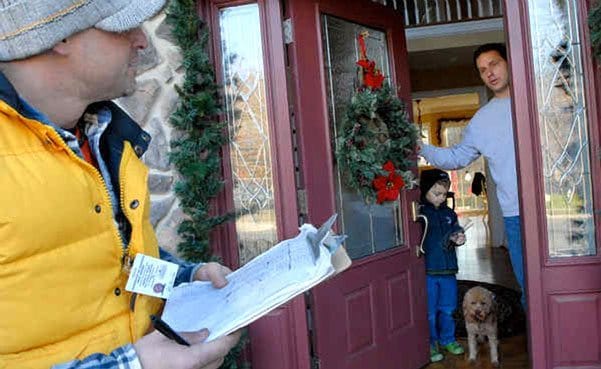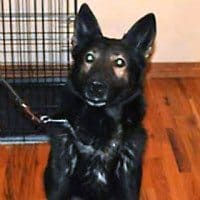If you like The Dog Files please join our Facebook Fan Page at http://www.facebook.com/dogfiles
Also, follow us on Twitter at http://www.twitter.com/dogfiles

By James Osborne For Philly.com
It begins with a knock on the door of a well-appointed house on a quiet street in a South Jersey suburb.
Roxy and Lola, the Swallow family’s two golden retrievers, begin to bark, which is what John Fries is waiting for.
When the dogs’ owner, Nina Swallow, opens the door, Fries, dressed in a puffer vest and wool cap, is waiting.
“I’m here conducting a dog census for Haddon Township,” he says, holding a clipboard. “Are those dogs licensed?”
On doorsteps across the state, residents are opening their doors to find municipal workers conducting house-by-house searches to check for unlicensed dogs.
Under a state law that health officials estimate dates to the 1950s, when rabies was a real threat to household pets, New Jersey towns are required to conduct the census every two years.
“I started here in 1985, and there was a requirement then,” said Faye Sorhage, chief veterinarian for the Department of Health and Senior Services. “It’s pretty much eliminated dog rabies in New Jersey.”
As the rabies threat has declined, so has the number of municipalities following the little-known regulation. In 1980, 91 percent of towns submitted canvases to the state; in 2008, only 32 percent did so, according to health department records.
Chesilhurst, a mostly low-income community near the Pine Barrens, does not participate in the census and won’t for the foreseeable future, Mayor Michael Blunt said.
“Chesilhurst has so many other problems, the last thing we’re concerned about is a dog census,” he said. “The minute you start giving people tickets, you bring hell on yourself.”
Under state rules, if a resident is found to have an unlicensed dog in his or her home, the municipality can send out a bill for the license with the threat of a fine for nonpayment.
For New Jersey residents, who generally consider themselves to be some of the most onerously taxed people in the country, the $10 to $20 charge is like a red flag to a bull.
A visit from Fries earlier this month left Chuck Rupertus, owner of a small landscaping company, irate.
“Why do we even have this guy? I pay $14,000 a year in property taxes, and they’re nickel-and-diming me about my dog. It’s not costing anybody in the town,” he said. “That’s New Jersey for you.”
As Fries makes his way around Haddon Township, a task he began in October and doesn’t expect to complete until the end of January, he has time to contemplate.
He’s noticed, for instance, that pet owners in the wealthier sections of town are far more likely to license their dogs. And, after an incident in which a resident called the police on him, he realizes it’s important when knocking on doors to wear identification and to sound official.
“Word has been getting around town, so now people are like, ‘We’ve been expecting you,’ ” said Fries, a 40-year-old graphic designer who was laid off last year and welcomed the part-time work in the town where he lives. “But most people have no idea. My sister laughs at me about it, but it’s not a hard job.”
Requiring owners to license their dogs is a fairly common, if little enforced, policy in most U.S. cities and towns. But the taking of a door-to-door “dog census” seems unique to New Jersey.
While officials at the American Veterinary Medical Association could not rule out other census-takers, a spokesman said, “We haven’t heard of any other states doing it.”
Among local elected officials, the census is something of a joke. When learning about the law, one politician said, “Do I really have to do this?”
At least in the minority of towns that participate, the census has reaped an increase in dog-licensing revenues.
“It’s an obligation, but if we can generate some fees from it . . . we’re always trying to think of ways we can limit the tax increases,” Haddon Township Commissioner John Foley said.


why do they not license cats. there are people who feed stray cats all year long in amwell township. these cats are ferrill, may even have rabies, endangering dogs and people. new jersey has a stupid law about dogs and rabieshots. they would make more monies on catrabies as there are many,many more cats then dogs in n j.